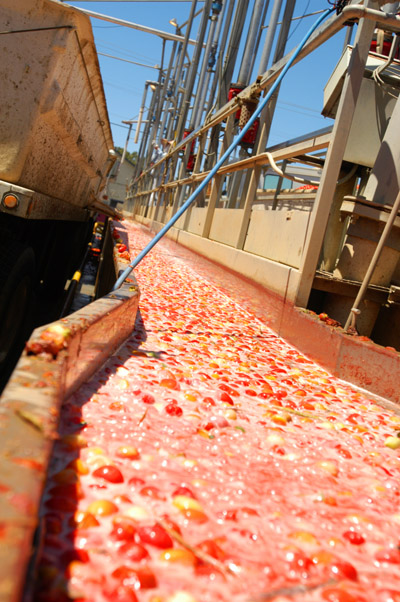
San Benito Foods management agreed with city officials Monday to
decrease the cannery’s noise level by next year’s summer canning
season.
After the city’s decibel measurements taken on Thursday revealed
the cannery’s downtown operations were
”
considerably over
”
allowable limits, Hollister officials requested the meeting,
according to Hollister Code Enforcement Officer Tim Burns.
San Benito Foods management agreed with city officials Monday to decrease the cannery’s noise level by next year’s summer canning season.
After the city’s decibel measurements taken on Thursday revealed the cannery’s downtown operations were “considerably over” allowable limits, Hollister officials requested the meeting, according to Hollister Code Enforcement Officer Tim Burns.
During that discussion, Plant Manager Larry Pitts was receptive to city officials’ request to quell the noise, Burns said.
The two sides agreed to a “pledge of cooperation,” Burns said. And San Benito Foods will immediately research approaches for lessening the noise from the plant’s steamers and condensers.
“We realize it’s not something that’s going to be resolved quickly or necessarily easily,” Burns said. “We were looking for some sort of commitment from the cannery.”
Burns was joined by City Attorney Elaine Cass in the discussion with Pitts.
San Benito Foods’ tomato canning season runs from mid-July through early October. The company – which is a division of Washington-based Neil Jones Food Companies – cans more than 100 tomato-related products.
It employs 600 people, with about 500 working during the 10-12 week summer canning season.
San Benito Foods’ facilities, including the tomato processing plant, stretch about five blocks to Fourth Street from the main entrance at the corner of Hawkins and Sally streets.
Burns decided to measure the noise levels when a Sally Street resident complained in late July. The man, who requested anonymity, lives in a home neighboring the processing plant. He said the constant sounds emitted are the “worst it has ever been,” and he can’t sleep without closing windows. Many other residents of the neighborhood had expressed a similar sentiment in Friday’s Free Lance.
Burns used a noise meter and measured from five locations throughout Hollister, assessing each spot at three separate times – 11 a.m., 6 p.m. and 11 p.m. The results showed a consistency of noise intensity throughout the day, he said.
The city’s noise ordinance calls for regulation according to several standards, including citizen complaints and decibels. The noise level is not to exceed 55 decibels during daylight or 50 after sunset, according to the ordinance.
Burns would not say specifically how high measurements reached. He did, however, say they were “considerably over” the 50-55 mark and “substantial enough where it concerns (the city).”
“You can hear it from the San Benito High School football field and behind Target,” he said.
According to the agreement between the city and San Benito Foods, the two sides will work to reduce the cause and lower the noise by the time the 2004 canning season begins, Burns said.
Pitts also requested the city’s readings so San Benito Foods could use them as a reference point for the expected improvements.
Pitts has said he suspects much of the outside noise is produced from the plant’s steam and cookers, which operate 24 hours a day, seven days a week. The cannery most recently attempted to muffle the noise in 1987, Burns said.
The city, according to officials, had not received complaints until this year. City Manager Dale Shaddox said he spoke with Burns and Cass on Monday morning, and officials are unclear whether cannery noise has increased throughout the years because measurements were not previously administered.
“Before (the complaint this year), people just took it for granted there was going to be noise during the canning season,” Cass said.
The cannery, which was built in 1915, existed before much of the nearby housing had been constructed. Many residents have argued the cannery’s long-standing presence should be grounds for allowing the noise.
“We all recognize the cannery pre-dates much of the residential development,” Cass said.
Pitts was also concerned about the noise levels and any possible disturbance to the nearby residents, according to officials. The cannery on Monday, Cass said, “reiterated a good neighbor policy.”
Burns said he left Monday’s meeting with a positive feeling. And Cass said she has “every reason to believe” the cannery will cooperate.
“I think we can bring some relief to those people in a reasonable amount of time,” Burns said.








